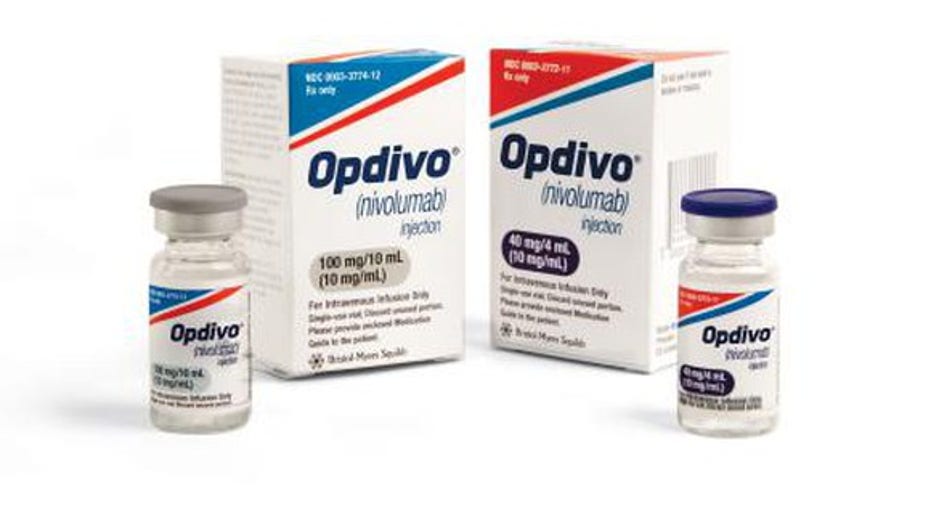CheckMate Again for Bristol-Myers Squibb Co. As Shares Dip 10%

Image source: Bristol-Myers Squibb.
What happened
Shares of global drugmaker Bristol-Myers Squibb (NYSE: BMY) tumbled as much as 10% during Monday's trading session following the release of its primary data from the CheckMate-026 study involving its blockbuster cancer immunotherapy drug, Opdivo.
So what
In August, Bristol-Myers Squibb announced that its phase 3 CheckMate-026 study involving Opdivo as a monotherapy treatment for first-line advanced non-small cell lung cancer failed to meet its primary endpoint of a statistically significant improvement in progression-free survival in patients whose tumors had PD-L1 expression of at least 5%. What we didn't know at the time was how close or far away from its goals Opdivo was. We now have that answer.
Based on a press release over the weekend, Opdivo's median PFS in patients with PD-L1 expression greater than or equal to 5% was 4.2 months, compared to 5.9 months in patients with platinum-based doublet chemotherapy. The hazard ratio of 1.15 implies slight favorability toward chemotherapy as opposed to Opdivo as a monotherapy in first-line advanced NSCLC. In terms of survival, patients taking Opdivo demonstrated a very modest edge of 14.4 months versus 13.2 months for chemotherapy. In sum, Opdivo failed miserably to get anywhere close to reaching its primary endpoint.
Making matters worse, over the weekend,Merck (NYSE: MRK) announced that its cancer immunotherapy Keytruda hit its mark in a first-line advanced NSCLC study in patients whose tumors had PD-L1 expression of at least 50%. According to the phase 3 KEYNOTE-024 trial, Keytruda cut the risk of disease progression or death by 50%, with progression-free survival in the Keytruda arm of 10.3 months compared to just 6 months for the chemotherapy arm. Furthermore, 80.2% of Keytruda patients were alive at the 6-month mark compared to 72.4% of the chemotherapy arm, and there was a clear confirmed response rate improvement for Keytruda (45% vs. 28%) compared to the chemotherapy arm.
In other words, Keytruda is lined up for a first-line advanced NSCLC approval, and Opdivo is not.
Image source: Merck.
Now what
Though this news is nothing short of shocking, and it's shaken Bristol-Myers Squibb's investors to the core, I would strongly suggest against giving up on Opdivo just yet.
Investors should keep in mind that that the CheckMate-026 trial was designed as a monotherapy, and historically, cancer immunotherapies work better when used in combination with existing oncology drugs. Also note that Opdivo remains a foundation therapy for a number of cancer treatments, including second-line NSCLC and renal cell carcinoma. It's not uncommon for different cancers, and cancer stages, to respond differently to a medication, so it would be unwise to overreact to today's news.
Bristol-Myers Squibb still offers dozens of ongoing clinical and planned combination and monotherapy opportunities with Opdivo, and based on its track record, at least some of them are likely to succeed. While peak annual sales estimates of Opdivo can rightly come down a bit after its decisive first-line NSCLC failure, and peak sales estimates for Merck's Keytruda can rightly be increased, Opdivo still has the potential to provide significant top- and bottom-line growth for Bristol-Myers going forward.
With its PEG nearing one, I believe value and growth investors may want to give Bristol-Myers Squibb a closer look.
A secret billion-dollar stock opportunity The world's biggest tech company forgot to show you something, but a few Wall Street analysts and the Fool didn't miss a beat: There's a small company that's powering their brand-new gadgets and the coming revolution in technology. And we think its stock price has nearly unlimited room to run for early, in-the-know investors! To be one of them, just click here.
Sean Williamshas no material interest in any companies mentioned in this article. You can follow him on CAPS under the screen nameTMFUltraLong, and check him out on Twitter, where he goes by the handle@TMFUltraLong.
The Motley Fool has no position in any of the stocks mentioned. Try any of our Foolish newsletter servicesfree for 30 days. We Fools may not all hold the same opinions, but we all believe thatconsidering a diverse range of insightsmakes us better investors. The Motley Fool has adisclosure policy.



















